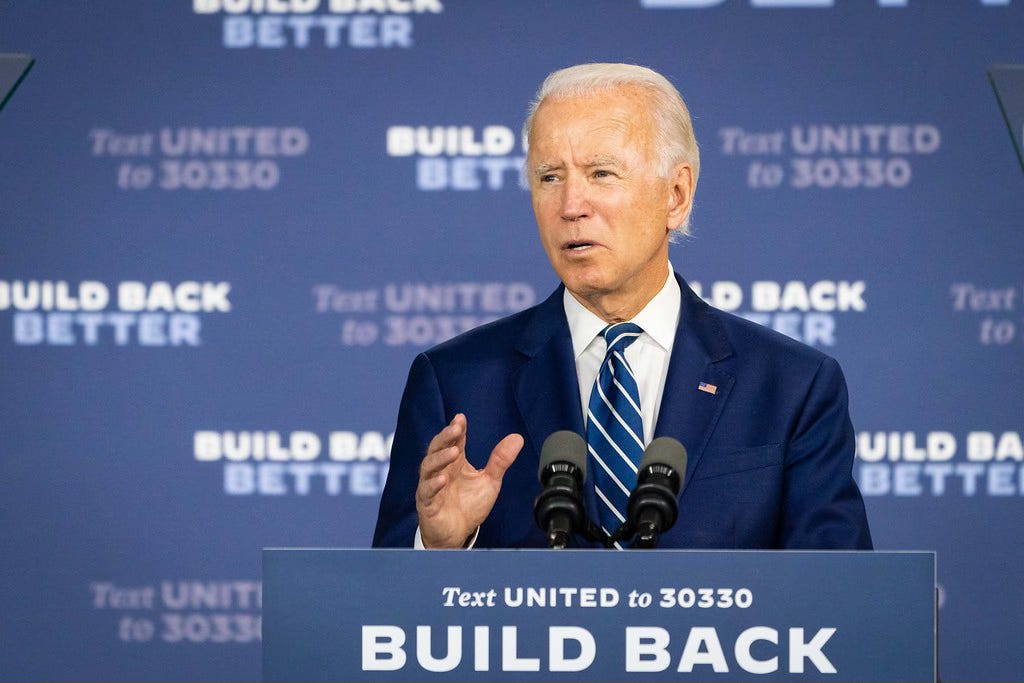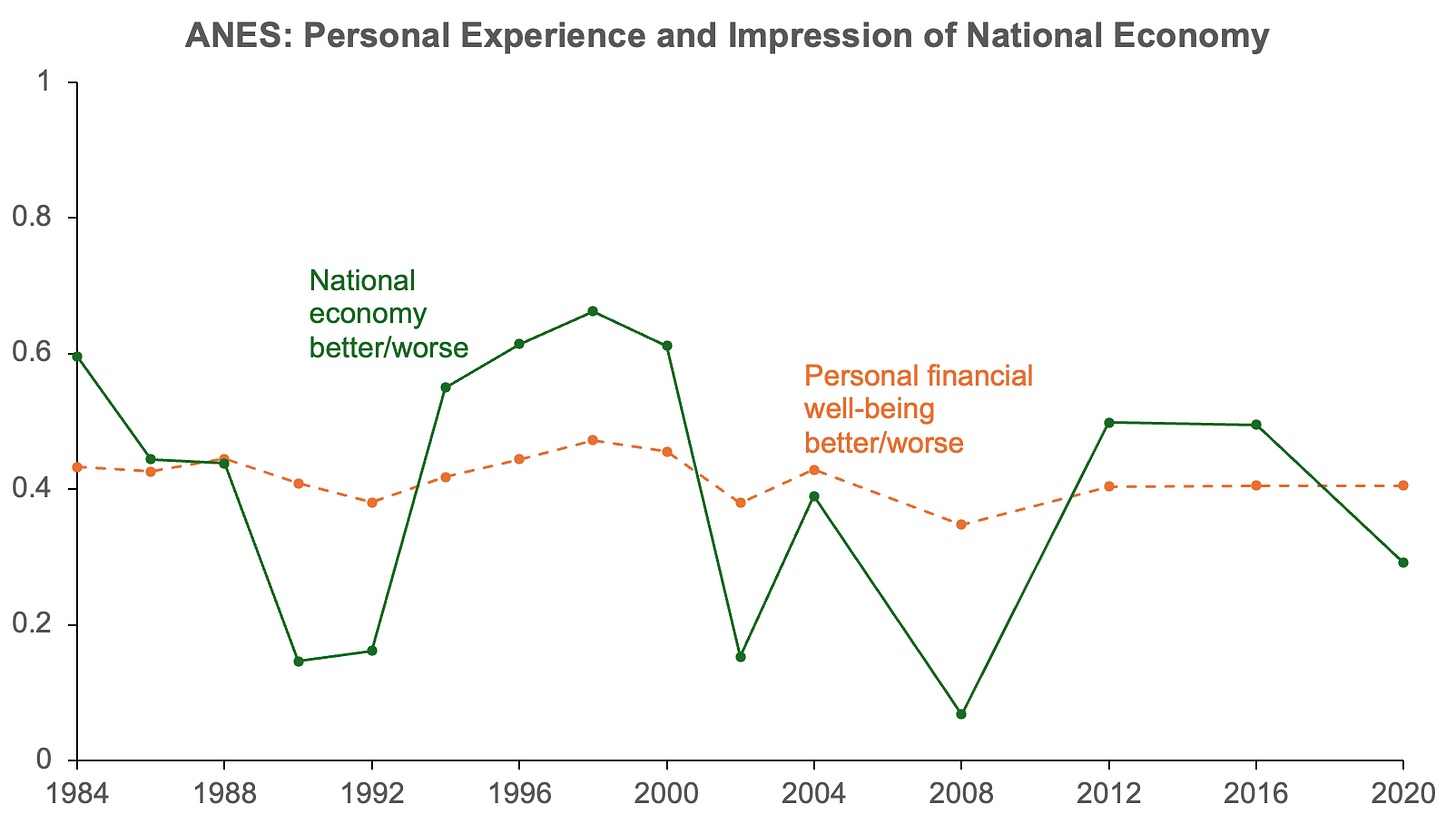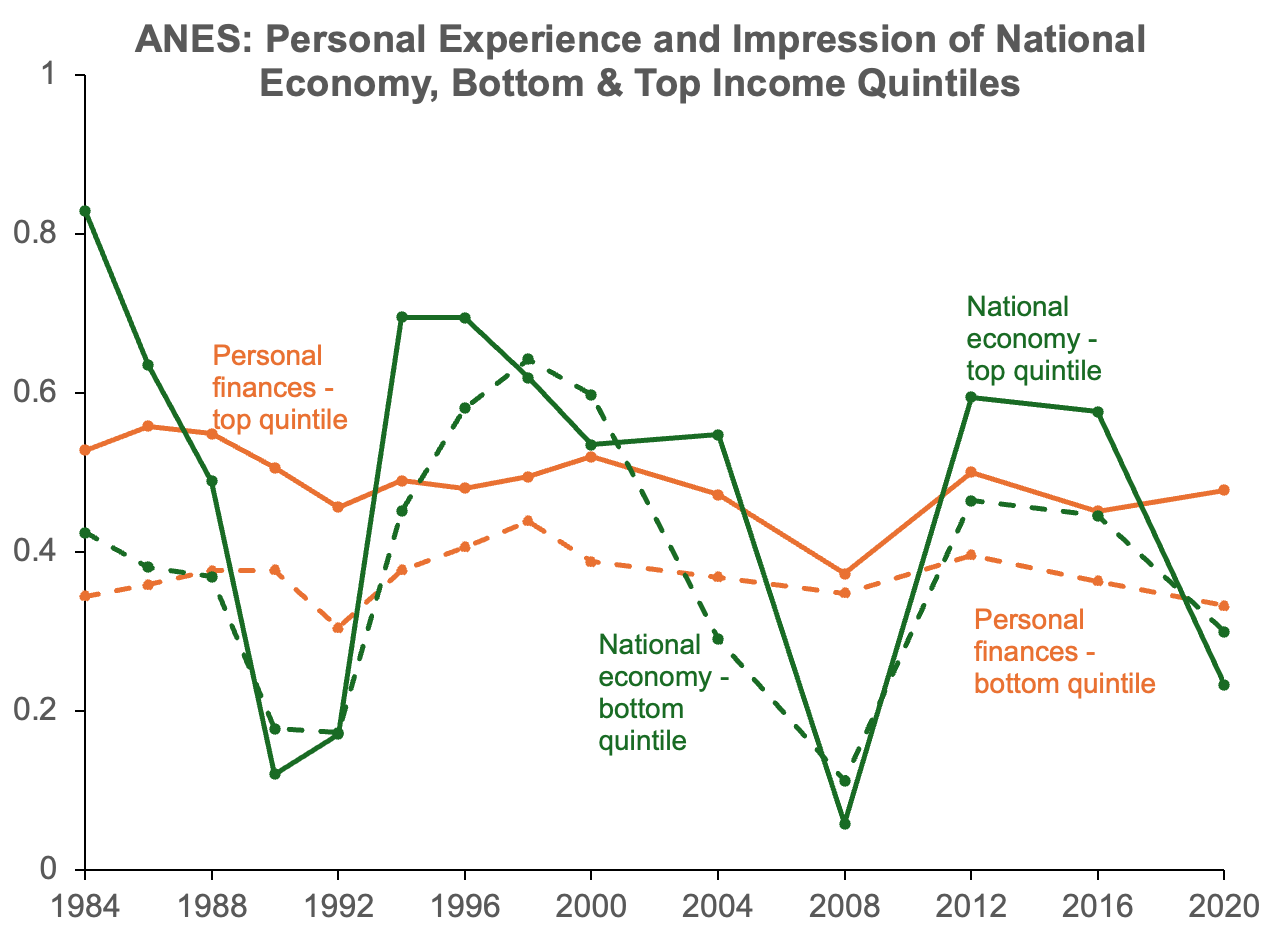When will people acknowledge the economy is good? They might not.
People's impressions of their own financial situation and the country's don't always align
There’s a pretty solid consensus emerging that if Joe Biden gets reelected this fall, it will be because a) voters came to see the economy as doing well, and b) they credited Biden for it. It’s not crazy that that will happen, but at least so far, we’re not seeing much change in the polls that continue to show Biden tied with Trump or losing slightly to him.
Paul Krugman has a good recent piece on the disconnect between people’s impressions of the national economy and of their own financial circumstances. As he notes:
In the latest poll, of Michigan voters, only 35 percent of people said that the national economy was excellent or good, while 65 percent said it was not so good or bad. But when asked about their personal finances the proportions were basically reversed, with 61 percent saying that they were in excellent or good shape and 38 percent saying they were in not so good or bad shape.
He cites polls from several other states showing almost exactly the same thing.
Now, it’s certainly plausible that, after people enjoy their reasonably good personal circumstances long enough, they will come to see the national economy in similar terms. So maybe it’s just a matter of time. Or maybe not.
To examine this issue, I looked at two questions in the American National Election Study about the economy. One asks people’s impressions of the national economy:
“Would you say that over the past year the nation’s economy has gotten better, stayed the same, or gotten worse?”
Another asks about people’s personal financial situation:
“During the last few years, has your financial situation been getting better, getting worse, or has it stayed the same?”
I’ve scaled the answers to those questions to range between 0 and 1, with 1 the most positive answer about the economy. The figure below shows the mean responses from people since 1984. A few things stand out about this. One is that people’s perceptions of the national economy do seem to vary with actual recessions and booms (or at least with media coverage of recessions and booms). They were bearish on the national economy in 1990-92, in 2002 and 2008, and then again going into 2020. But they felt good about the economy in the later 1990s, the mid 2010s, etc.
But another thing that stands out is how almost completely unmoving the personal financial answer is. It definitely responds a bit to economic conditions — note the dips in 1992 and 2008 — but just not that much.
Also, it isn’t the case that people who respond to ANES surveys are more financially comfortable than others. The graph below charts the same information as the graph above, only the dotted lines show the patterns for the bottom quintile of income earners and the sold lines show the patterns for the top quintile. Yes, the wealthier people are somewhat more likely to say things are going well for them, but not by a lot, and the same pattern from the graph above repeats itself.
Now the ANES, coming out every two to four years with these questions, is something of a blunt tool, and it’s possible there’s more variation going on in here than this shows. But at least what this suggests here is that yes, people’s assessment of the country’s economic situation could improve as people’s personal situations do, but there’s no reason it has to. These numbers can move pretty independently of each other.
Let me just add to this a very smart piece from Zachary Carter at Slate. As Carter suggests, most people follow the cues of people they respect and trust when trying to come up with opinions about how the national economy is performing. Unsurprisingly, conservative political figures and media are strongly negative on the economy. But importantly, so are a lot of figures on the center-left. Quite a few Democrats and left-leaning independents have likely been influenced by people like Larry Summers and Jason Furman — both prominent advisors to Barack Obama and other Democrats — who have been preaching doom on Biden’s economic policies from the beginning.
Further, as Carter notes, Biden’s economic policies have been some of the most progressive of the modern era, and are, in some ways, repudiations of the more centrist path Obama took. And they’ve taken some criticism from more centrist Democrats with solid credentials. If you’re a Democrat trying to understand Biden’s economic plans and his successes, you’re getting mixed messages at best, even from your own team.
I’ll also link here to a smart piece by John Sides and Michael Tesler at Good Authority, noting the ways that Biden’s situation could improve over the next year. As they note, there’s precedent for a Biden comeback, but a victory for him is far from guaranteed.






3 year old charts without reference to Covid, the Impact on the economy or government action.
Excess Government spending in good times and bad by Democrats and Republicans has resulted in over $30,000,000,000,000.00 in national debt but neither party talks about it or offers a solution. Runaway inflation and record high personal debt are not going make people feel better about their financial condition. Which candidate is going to make you feel better down the road if elected? It is like asking do you prefer the electric chair or hanging. Do you watch the news channel sponsored by the rope company or the news channel sponsored by the electric company?